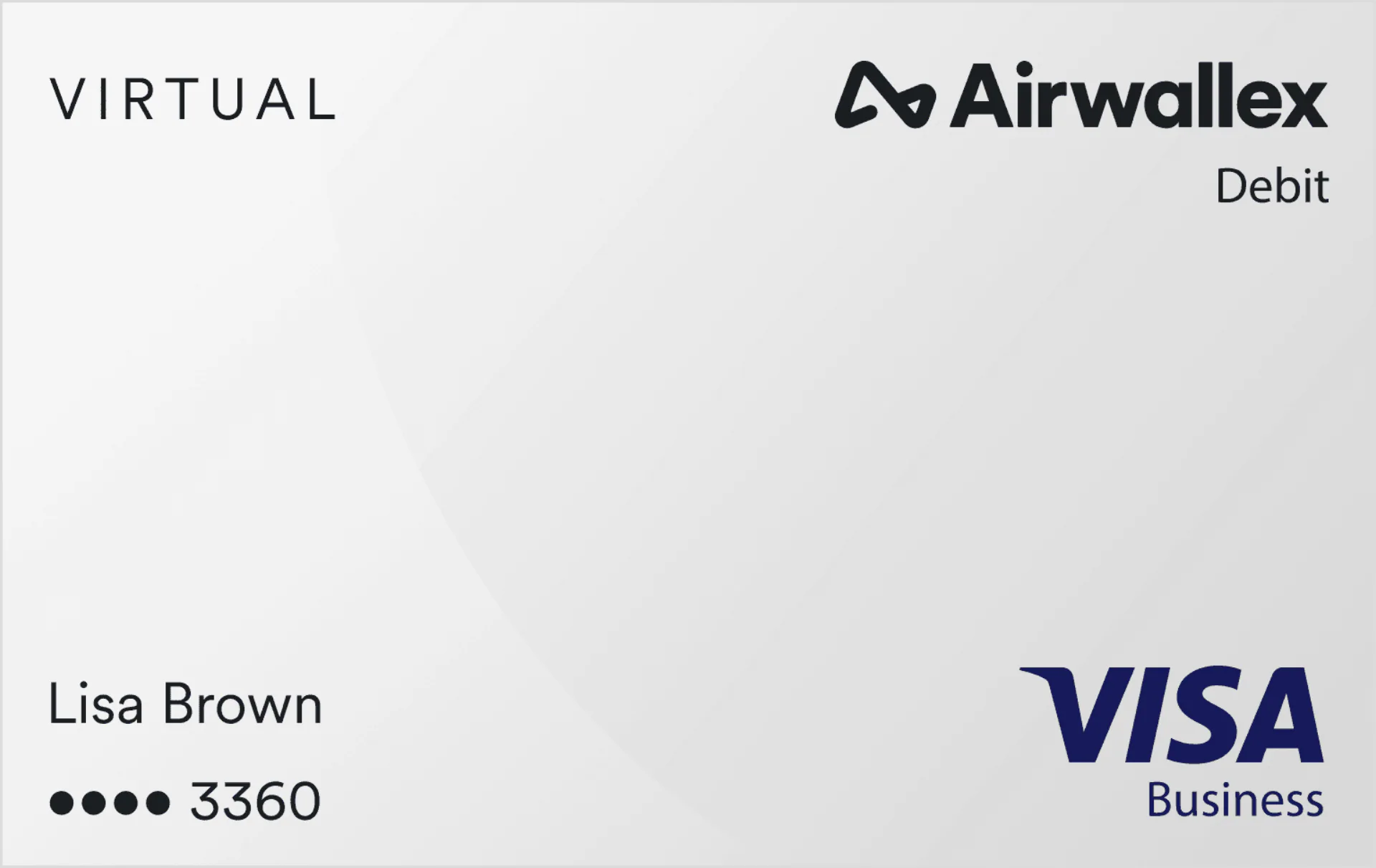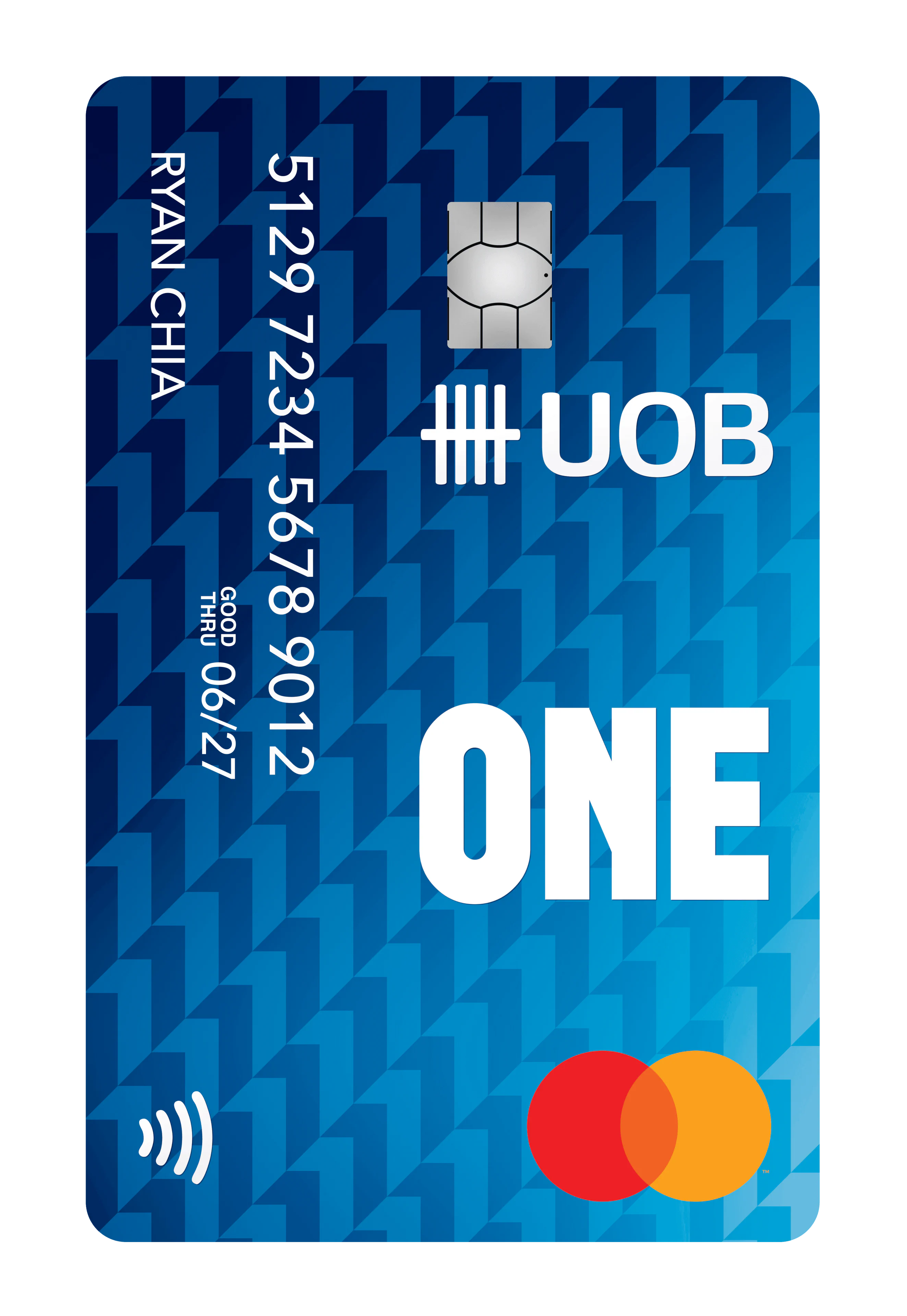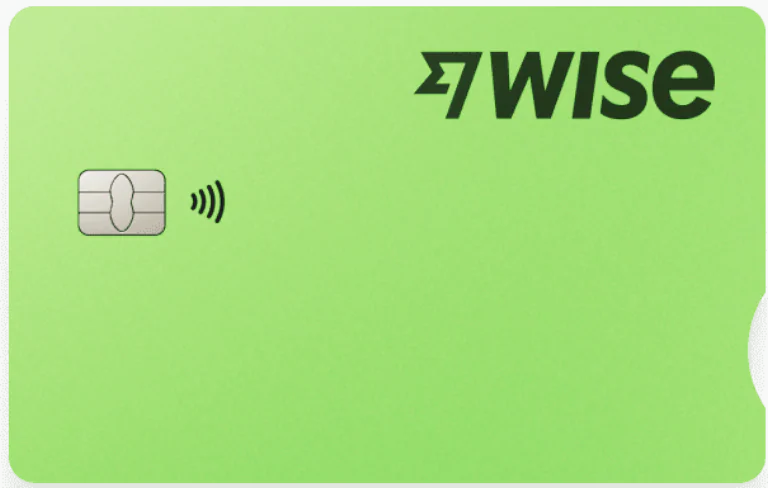Best Debit Cards in Singapore (2026)
Updated: 8 Jan 2026
- 0% foreign card transaction fees and no hidden charges
- No account or maintenance fees
- Multi-currency physical and virtual card, works with Apple Pay and Google Pay
- Instantly create, freeze, or cancel cards
- Customizable spending controls & real-time activity tracking
- Reduce reconciliation time by automatically syncing multi-currency transactions with Xero
- Read our full review of the Airwallex Corporate Card
- Airwallex Business Account required before card issuance
- Get up to 4% cashback on daily merchants (dining, online shopping, transport, telco, utilities)
- Get 1% cashback everywhere with mobile payments (Apple Pay, Google Pay and Samsung Pay)
- Pay with your mobile phone at more than 10,000 retail outlets in Singapore. You earn the same cashback on mobile payment as you do with your physical UOB One Debit Card
- Pair UOB One Debit Card & UOB One Account to enjoy up to 5.3% p.a. interest on your savings
- Over 1,000 deals, cashback, weekly coupons and exciting rewards all year round with Rewards+ on UOB TMRW
- More Cashback with UOB$ Programme - Get up to 10% instant UOB$ cashback on your favourite dine, retail and lifestyle brands island wide!
- Enjoy zero transaction fees overseas when withdrawing cash at UOB ATMs in Malaysia, Indonesia & Thailand
- Enjoy the complimentary travel insurance coverage when you travel with your UOB One Debit Card
- Enjoy year-long savings of 14% on your fuel purchases with the UOB One Debit Card
- Enjoy up to 20% off your petrol purchases at SPC with your UOB One Debit Card and SPC&U Card
- Online shopping rebate
- Grab/taxi rebate
- Spend at least $600 monthly based on your qualifying quarter to enjoy up to 4% cashback.
- Cash rebate is awarded every month.
- You will be required to opt-in to activate complimentary travel insurance coverage for your UOB One Debit Card before the departure of your trip
- Terms and conditions apply for all above-mentioned privileges. Visit here for more details. Insured up to S$100,000 by SDIC.
- Monthly spend required
- Rebate cap applied
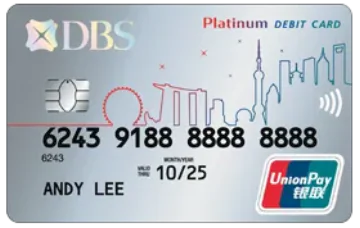
DBS UnionPay Platinum Debit Card
- Get up to 8% upsized cashback on any spend in Chinese Yuan (CNY), valid till 31 March 2026. (Original rate 5%).
- Enjoy a waiver of 3% transaction fee on amounts RMB 200 and above for Alipay and WeChat Pay transactions.
- Get 1% cashback on spend in any other foreign currency.
- Get 0.5% Cashback on local spend (SGD).
- Get S$7 ATM fee waivers on your cash withdrawals overseas and access to over 35 million merchants & 2 million ATMs
- Experience exclusive offers globally with UnionPay Global Privileges, such as complimentary hotel upgrades, dining and recreational offers.
- Min. S$400 spend with UnionPay per month required to qualify for boosted Cashback rate (capped at S$70 per month).
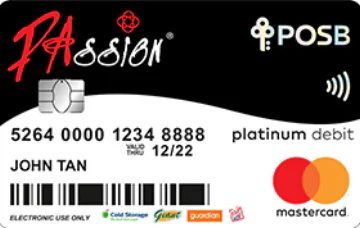
PAssion POSB Debit Card
- Enjoy a 4% rebate at Cold Storage, Giant, and Guardian
- Free PAssion membership. Enjoy a further 2% off member's rate when payment is made with the card.
- 1-for-1 tickets at selected family attractions
- 1% cashback at Takashimaya Department Store', 'Read our full review of the PAssion POSB Debit Card
- Read our full review of the PAssion POSB Debit Card
- You need to have a POSB Savings Account, DBS Savings Plus Account, DBS Autosave Account, or DBS Current Account
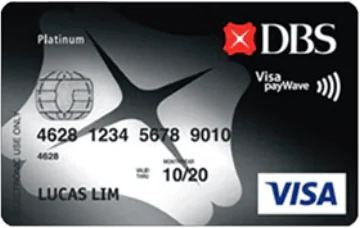
DBS Visa Debit Card
- Get 3% cashback when using Visa payWave by charging a min. of S$500 to your DBS Visa Debit Card and keeping your cash withdrawals to S$400 and below in the same month
- No foreign exchange fee with your Multi Currency Account
- 11 foreign currencies include: Australian Dollar, Canadian Dollar, Euro, Hong Kong Dollar, Japanese Yen, New Zealand Dollar, Norwegian Kroner, Sterling Pound, Swedish Kroner, Thai Baht and US Dollar
- You need to have a POSB Savings Account, DBS Savings Plus Account, DBS Autosave Account, or DBS Current Account
- Spend in 40+ currencies and 160 countries
- Two free ATM withdrawals up to S$350 per month, incurring 1.75% + S$1.50 fee per withdrawal afterwards
- No foreign transaction fees
- No account opening or maintenance fees
- Available as physical or virtual multi-currency card
- Virtual card number differs from physical card for added layer of security
- Get up to 3x virtual cards at a time for different expense types
- Start spending straight away with Google or Apple Pay
- Get real-time spend notifications & 24/7 anti-fraud measures
- Freeze and unfreeze card via app and instantly replace suspected compromised digital cards for peace of mind
- 1.75% + S$1.50 fee per withdrawal beyond the 2 free withdrawals per month.
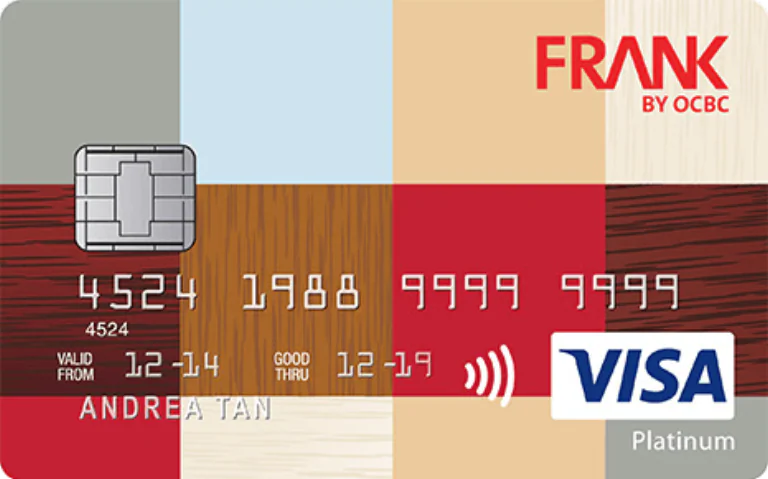
OCBC Frank Debit Card
- 120 stylish designs to choose from. Customisation fees range from S$0 to S$30 depending on card design.
- Earn cash rebates across your daily expenses on transport and online spend
- Get a 1% rebate with your FRANK Debit Card when you shop, eat, and ride
- Merchants include Grab, Zalora, Lazada, Fairprice Online, 7-Eleven, and McDonald's
- You need to have a OCBC Deposit Account
Debit card fees & charges to watch out for
Debit cards seem straightforward—you spend, the money comes out of your account. But hidden fees can quietly add up if you’re not careful. Let’s go through some common charges you should know, so you can avoid nasty surprises and keep your spending smart.
FX transaction fees
Shopping online on overseas sites or spending in foreign currencies? Be mindful of FX (foreign exchange) transaction fees. These fees usually sneak in when you pay in a currency that’s not SGD. Banks often charge between 2.5% and 3.5% on top of the exchange rate, meaning your $100 purchase could quietly become $103 or more.
For example, if you buy something from Amazon US or ASOS and pay in USD, your final bill will likely include this hidden fee.
Tip: If you shop overseas frequently, consider cards like the Wise Multi-Currency Card, which offers real exchange rates with no hidden markup and much lower conversion fees. For occasional online buys, you can also look out for debit cards that waive FX fees when linked to foreign currency wallets.
ATM withdrawal charges (local & overseas)
Withdrawing cash at ATMs in Singapore is mostly free when you stick to your bank’s machines or networks like atm^5. But once you step outside — say, when you travel — fees can pile up quickly.
Overseas ATM withdrawals usually come with two charges:
-
A flat withdrawal fee (often $5–$7 per withdrawal).
-
A percentage fee on the withdrawal amount (typically 1–3%).
For example, withdrawing $200 overseas might cost you an extra $10–$15 in fees. Even some local ATMs, if not part of your bank’s network, may charge admin fees.
So plan ahead before your trips. Cards like DBS Visa Debit offer limited free withdrawals overseas, while Wise gives you two free overseas withdrawals each month up to a certain limit. Withdraw more in one go to minimise repeated charges.
Monthly maintenance fees
Some debit cards come with linked savings or current accounts that require you to maintain a minimum balance. If you don’t meet this, a fall-below fee applies.
For example, OCBC 360 Account holders need to keep $3,000 daily on average, or pay a $2 monthly fee. Younger adults using OCBC FRANK enjoy fee waivers below age 26, but after that, a minimum balance applies.
While $2 doesn’t sound like much, over a year, it adds up to $24—that’s a nice lunch or two!
Card replacement fee
Lost your card? Banks often charge a replacement fee, typically between $5 and $15. Wise, for instance, charges $4.32 if you lose your card. OCBC FRANK is a little more generous. The replacement fee may be waived in some cases, like fraudulent activity or expired cards.
What to look out for in a debit card
Picking a debit card might seem easy, but not all cards are created equal. Some quietly help you save and earn rewards, while others can come with sneaky limitations. Here’s how to choose one that fits your daily lifestyle — so every dollar works harder for you.
Choose based on linked account interest, fees, and perks
Your debit card is often linked to a savings or current account, and that matters more than you think. Look beyond the card itself. Some accounts offer attractive interest rates when you credit your salary, save consistently, or spend on the linked debit card.
For example, OCBC 360 Account holders can unlock higher interest rates by meeting simple criteria like salary crediting and spending. On the other hand, accounts like DBS My Account offer more flexibility with no fall-below fees, but don't reward savings as much.
Consider digital wallet support (Apple Pay/Google Pay/Samsung Pay)
These days, many of us leave home without our physical wallets. That’s where mobile payments come in handy. A debit card that works seamlessly with Apple Pay, Google Pay or Samsung Pay makes life much easier, from tapping in at MRT gantries to buying kopi or groceries.
Most newer cards, like DBS Visa Debit and OCBC FRANK, already support major digital wallets. But it’s worth double-checking, especially if you rely on your phone or smartwatch to pay.
Link with PayNow/Paylah/Pay Anyone for seamless transactions
In Singapore, instant transfers are part of daily life. Whether you’re splitting dinner with friends, paying for tuition fees, or sending angbao digitally during CNY, it’s all about convenience.
Most local debit cards link easily with PayNow, and banks like DBS and OCBC also offer apps like PayLah and Pay Anyone to make cash transfers even quicker.
Frequently asked questions about the best debit cards in Singapore
-
Having a valid pass (Employment Pass, S Pass, Student Pass, Dependant Pass, etc.)
-
Opening a bank account with the bank
-
Providing proof of address in Singapore
-
Staying debt-free
-
Controlling your spending
-
Avoiding interest charges
-
Want to build credit history
-
Enjoy perks like miles, cashback, or insurance
-
Can pay your bills in full and on time
Not always. An ATM card is primarily used to withdraw cash or check your account balance at ATMs. It may or may not have payment functions.
A debit card, on the other hand, does everything an ATM card does plus more. It can be used to make purchases in stores, shop online, and pay bills—all directly from your bank account.
In Singapore, most banks now issue debit cards instead of basic ATM cards, so you can enjoy both ATM access and payment features in one card.
A debit card lets you spend money straight from your bank account. Whenever you make a purchase, whether online, at a store, or overseas, the money is immediately deducted from your account balance.
Unlike a credit card, you can only spend what you have. This makes debit cards a safer option for those who want to avoid debt or overspending.
In Singapore, you can typically apply for a debit card once you turn 16 years old.
Some debit cards, like OCBC FRANK, are designed especially for young adults and students. Do note, though, that you’ll need a linked bank account to apply.
If you’re below 16, most banks offer youth or kids accounts, which usually come with basic ATM cards instead.
Usually, no. Debit cards need to be linked to an account (savings or current) because they pull money directly from your account when you spend.
However, there are multi-currency accounts (like Wise) that offer debit cards linked to their wallets. These work similarly but aren’t traditional savings accounts.
Yes—most banks in Singapore allow foreigners to apply for debit cards, but you’ll need to meet the eligibility criteria.
This usually includes:
Some banks may require you to visit a branch in person to apply.
It depends on your spending habits and financial goals.
A debit card is great for:
A credit card is better if you:
Latest debit card news
Debit Cards Versus Credit Cards in Singapore: Which Should You Use?
Debit cards and credit cards can both be used to make purchases or payments, but they each may work better than the other in different situations. Find out more about their specific uses to know exactly when to whip out your debit or credit card to maximise your savings.
